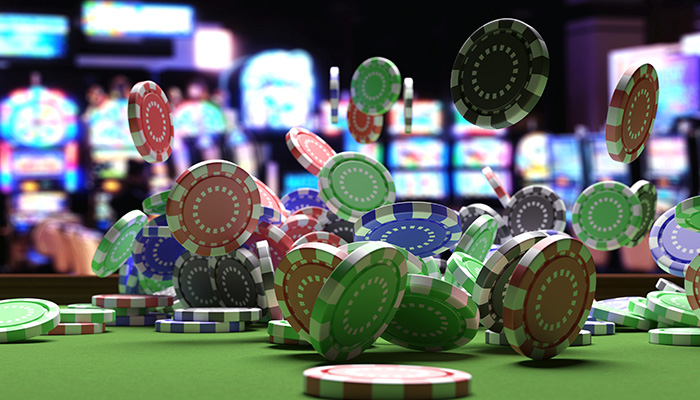Gambling slots machines have enthralled players for many years, pulling them into a world of flashing lights, enticing sounds, and the thrill of luck. These devices, commonly found in colorful casinos, combine aspects of chance and tactics, making them an attractive option for beginners and experienced gamblers too. But what is it that makes these machines so attractive? The answer lies in the intricate psychology at play as players engage with these vivid reels.
Whether it’s the rush of excitement while waiting for the result of a spin or the euphoric feeling of a big win, the emotional response elicited by casino slots is considerable. The design of these games is meticulously designed to stimulate the brain’s pleasure system, creating an event that can be both exciting and compulsive. BL555 Grasping the mental factors behind playing casino slots machines can provide insight into the reasons so many individuals are drawn to them and how they affect behavior and decision-making in the gambling setting.
Comprehending the Appeal of Slot Machines

Slot machines have a singular capability to captivate players with their vibrant visuals and tempting sounds. The dazzling lights and captivating themes create an appealing atmosphere that draws people in. Each spin of the reels offers the possibility of a huge win, sparking a sense of excitement and expectation that keeps players coming back for more. This multisensory experience plays a vital role in the appeal to casino slots games, as it engages not only the mind but also the emotions.
A notable factor adding to the allure of slot machines is the notion of instant gratification. Differing from other casino games that necessitate skill or strategy, slots offer instant results with each spin. The rapid pace of the game allows for swift engagement, allowing players to experience the excitement of winning or the discouragement of losing in a matter of seconds. This immediate feedback loop can lead to a profoundly habit-forming experience, as players pursue the next likely payout while being mesmerized by the game’s constant opportunity for thrill.
Furthermore, the mindset of jackpot prospect cannot be ignored. The allure of hitting a fortune-altering payout keeps players returning, frequently outbalancing the odds against winning. Many players find themselves fantasizing about the chance of striking it rich, fueled by stories of players who have won big. This sense of anticipation, combined with the rush of the game, creates an unavoidable lure that characterizes the world of casino slots and makes them a beloved among players.
The Role of Reinforcement in Gambling
The role of reinforcement plays a vital role in the psychology of interacting with casino slots games. When players participate with these machines, they face various forms of reinforcement that can shape their behavior. Positive rewards is particularly powerful; obtaining a win, or even the chance of winning, can create a rush that keeps players coming back for more. The immediate feedback from the reels spinning, coupled with audio cues and visual stimuli, further enhances this gratifying experience, reinforcing the urge to continue playing.
The unpredictability of winning in casino slots games also ties into the concept of intermittent reinforcement. This psychological phenomenon happens when rewards are given out at random intervals, making the expectation of a potential win more thrilling. Players may go for long periods without significant wins but are drawn back by recollections of past jackpots or the chance of future ones. This variability heightens excitement and keeps players hoping for that upcoming win, embedding them deeper into the betting cycle.
Ultimately, the communal element of playing casino slots games can amplify reinforcement. Numerous participants enjoy the communal atmosphere of a casino, where they might see others winning, share successes, or even sympathize over losses. This social reinforcement can create a shared experience that encourages ongoing engagement. Players might feel motivated to continue not only for personal gain but also to experience the fellowship that comes with gambling, reinforcing their connection to the game.
The Impact of Game Design on Player Behavior
The design of casino slots games plays a crucial role in guiding how players act and enhancing the gaming experience. Elements such as graphics, audio, and themes are intentionally crafted to attract players and keep them involved. Vivid hues and inviting animations create a aesthetically stimulating atmosphere that can lead to extended play sessions. Additionally, themes ranging from ancient civilizations to modern trends appeal to various interests, making the games attractive to a broad audience. This focused design encourages players to invest more time and money into the gameplay.
Another significant aspect of slot design is the implementation of incentive structures and features like extra rounds or free spins. These mechanics are crafted to produce a sense of excitement and anticipation, which can trigger the release of dopamine in the brain. This chemical reaction reinforces the action of gambling by associating the game with enjoyable feelings. By providing enticing rewards, casinos encourage players to keep playing, which often leads to increased betting and extended gameplay. The mental thrill of potentially hitting a jackpot or triggering a bonus keeps players coming back for more.
Finally, the community aspects integrated into casino slots can also affect player behavior. Many modern slots include capabilities that allow players to connect with others through leaderboards or shared achievements. This social aspect can enhance the overall experience, as players may feel a sense of belonging or rivalry that motivates them to engage more deeply. The mix of personal thrill and social interaction creates a dynamic environment that not only entertains but also promotes consistent gameplay, showing how deliberate game design can significantly impact gamer actions.